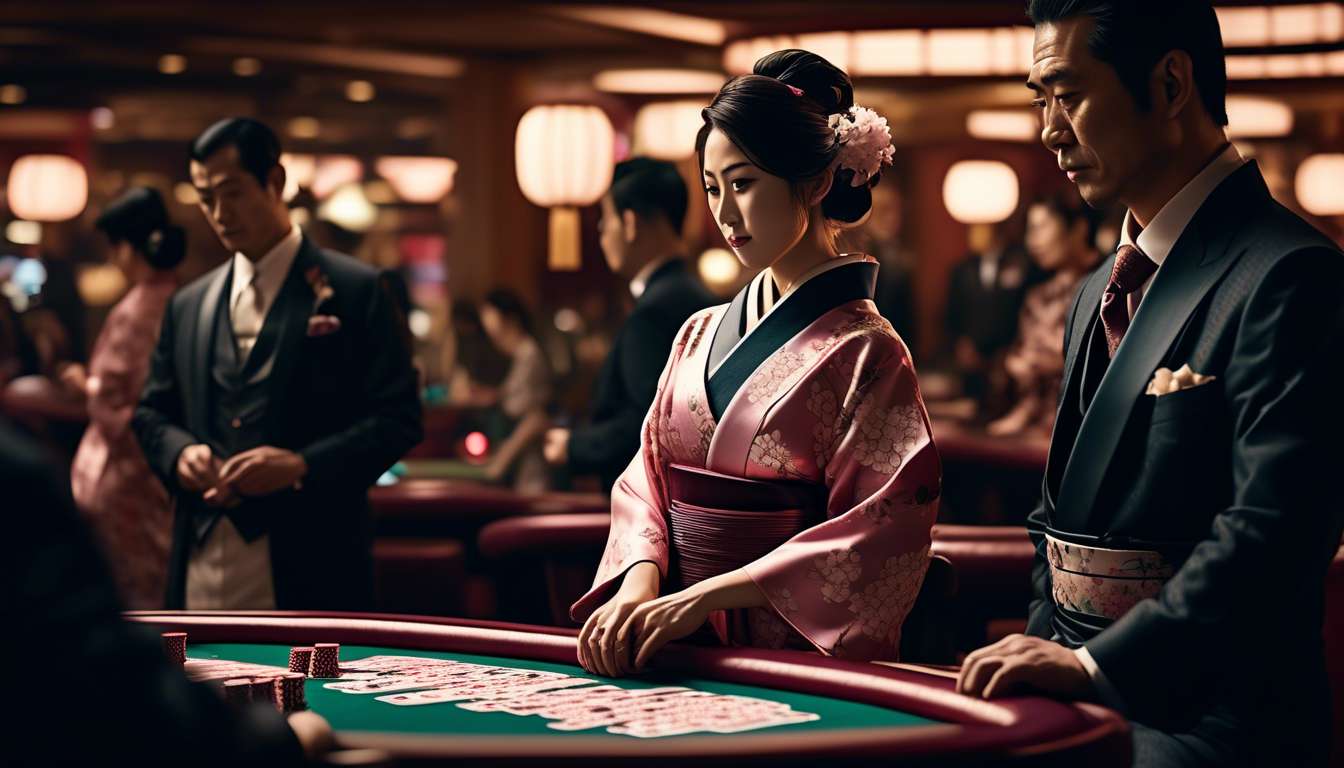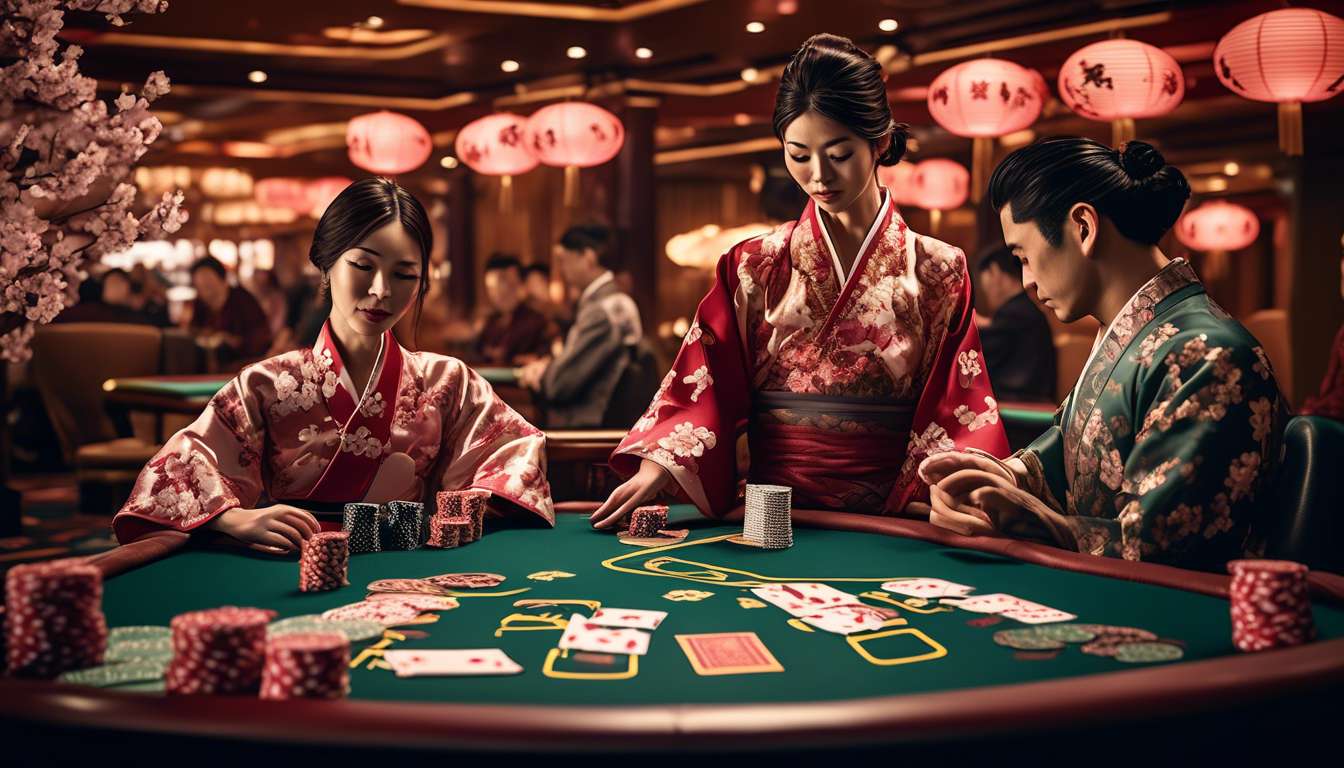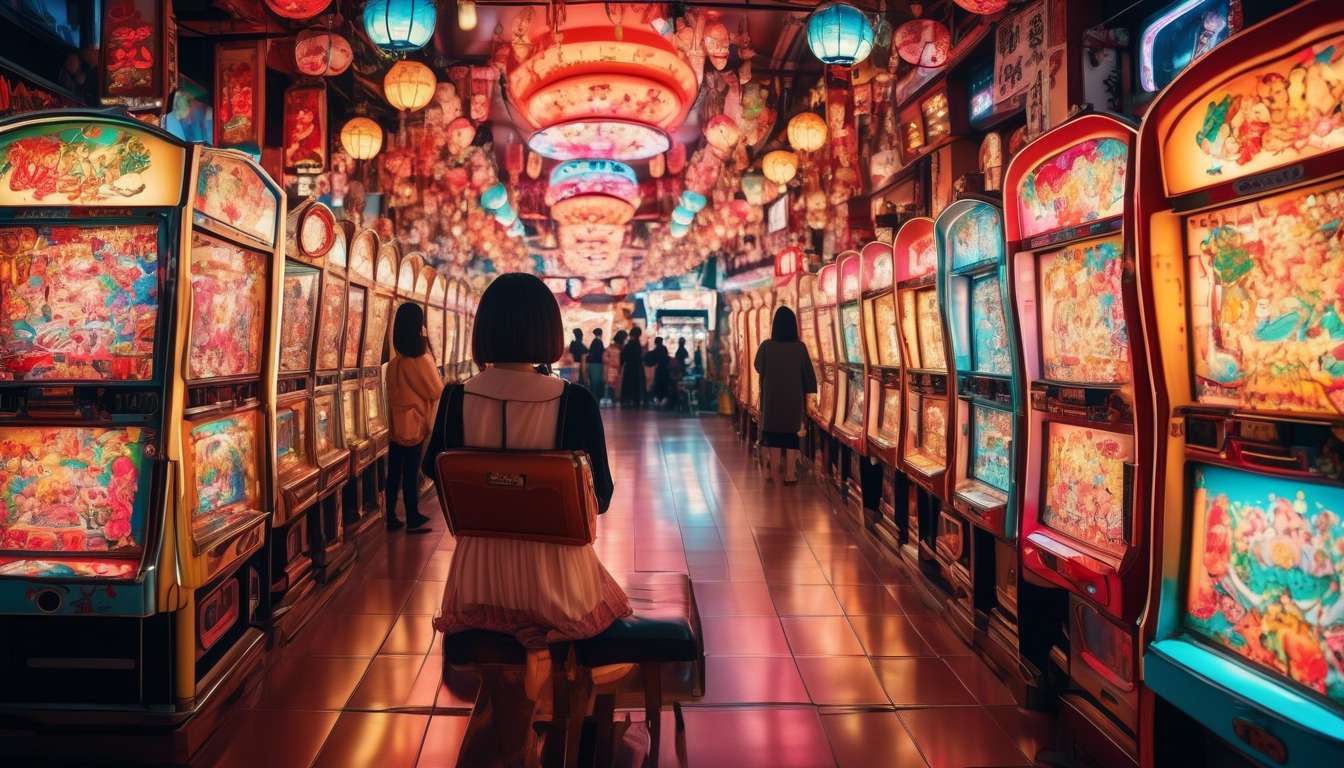When we step into a Japanese casino, the vibrant atmosphere and the rhythmic clatter of chips immediately draw us into a world that balances tradition with modern gaming. As we gather around the blackjack table, we quickly realize that understanding the game is only part of the experience. Equally important is mastering the unique etiquette that governs play in Japan’s casinos.
Our journey into this fascinating realm begins with observing the subtle yet crucial customs that distinguish Japanese blackjack from its Western counterparts.
From the respectful nods exchanged between players and dealers to the precise gestures used to signal our decisions, we discover that every action at the table is steeped in a culture that values respect and courtesy.
As we delve deeper, we learn that adhering to these unwritten rules not only enhances our gaming experience but also fosters a sense of camaraderie and mutual respect among fellow players.
The Significance of Bowing
In Japanese casinos, bowing plays a crucial role in showing respect and acknowledging fellow players and dealers. This simple bow communicates volumes without uttering a word, deeply rooted in Japanese culture.
Non-verbal communication in Japan emphasizes respectful handling of interactions, fostering a sense of belonging among participants. By bowing, we express gratitude and respect, creating an environment where everyone feels valued and connected.
When entering a game or approaching a table, a slight bow signals our willingness to engage respectfully. It’s not just about the mechanics of the game but about building a harmonious atmosphere.
Each bow shared, whether with players or dealers, reaffirms a shared commitment to this cultural practice. It serves as a reminder that participants are part of something bigger—a tradition that transcends the game itself.
Let’s embrace this custom, ensuring that our actions speak as loudly as our words. Bowing isn’t just a gesture; it’s an unspoken promise to honor each other.
Silent Communication with Dealers
In Japanese casinos, we often rely on subtle gestures to communicate effectively with dealers. This non-verbal communication creates a shared understanding, allowing us to feel connected and respected within the gaming environment.
A slight nod or bowing of the head can convey gratitude or acknowledgment of a dealer’s actions, reinforcing our mutual respect and consideration.
When we wish to ‘hit’ or ‘stand’, these gestures become particularly useful. Instead of speaking, we can:
- Tap the table gently to request a card.
- Wave our hand to decline one.
This form of communication not only maintains the flow of the game but also demonstrates our awareness of and adherence to cultural etiquette.
By engaging in this silent dialogue, we show our respect for the dealers and the casino’s atmosphere. The respectful handling of these interactions ensures everyone feels comfortable and valued, fostering a sense of belonging as we enjoy the game together.
Our actions speak volumes when words aren’t necessary.
Respectful Handling of Cards
Handling cards with care and respect is crucial in maintaining the decorum and atmosphere of Japanese casinos. When we sit at a blackjack table, we’re not just playing a game; we’re participating in a cultural experience. Respectful handling of cards goes beyond just avoiding damage—it reflects our understanding and appreciation for the traditions upheld in these gaming spaces.
In Japanese casinos, non-verbal communication plays a significant role. We often use subtle gestures, like bowing slightly to acknowledge the dealer or other players, as a sign of respect. This extends to how we handle our cards. We should:
- Pick them up gently
- Avoid sudden or exaggerated movements
- Maintain the calm environment
By treating the cards with respect, we show our fellow players and the dealer that we’re committed to the collective enjoyment of the game. Our careful actions and non-verbal communication foster a sense of camaraderie and belonging, making everyone’s experience more enjoyable.
Timing and Pace of Play
In Japanese casinos, maintaining a steady pace and timing during blackjack ensures a smooth and enjoyable experience for everyone at the table. Keeping the game flowing helps create a sense of unity among players and dealers.
One way to achieve this is through non-verbal communication:
- A simple nod or a slight bow can signal our readiness to proceed.
- These gestures show respect for our fellow players and the dealer.
These small actions foster a harmonious environment, making us feel like part of a cohesive group.
Respectful handling of cards is crucial as well. When it’s our turn, we should:
- Make our decision promptly.
- Use clear signals to indicate whether we’re hitting, standing, or doubling down.
This not only demonstrates our understanding of the game but also respects the time and focus of others.
By adhering to these unwritten rules, we contribute to a positive atmosphere where everyone feels welcome and engaged in the shared experience.
Etiquette for Handling Chips
Proper chip handling is essential in Japanese casinos to maintain an orderly and respectful gaming environment.
Key Practices for Chip Handling:
-
As we gather around the blackjack table, it’s important to handle our chips with care and precision.
-
Avoid splashing chips into the pot. Instead, place them neatly on the table to show respect for fellow players and the dealer.
Cultural Etiquette:
-
Bowing slightly when exchanging chips is a simple gesture that reflects a shared understanding of the importance of respect and harmony in our gaming circle.
-
This non-verbal communication speaks volumes about our appreciation for the collective experience and the culture surrounding us.
Mindfulness in Action:
-
When handling chips, always be mindful of others around us.
-
Stack chips neatly and avoid excessive movement that could distract or disrupt the flow of the game.
By practicing respectful handling, we contribute to a positive and inclusive atmosphere where everyone feels welcome and valued. Together, we create an enjoyable experience for all involved.
Understanding Non-Verbal Cues
In Japanese casinos, understanding and interpreting non-verbal cues is crucial for maintaining smooth interactions at the blackjack table. When we step into this vibrant environment, we’re entering a space where every gesture holds meaning.
Bowing is a significant form of non-verbal communication in Japan, signaling respect and acknowledgment. A subtle bow when joining or leaving the table can demonstrate our appreciation and willingness to engage respectfully with both the dealer and fellow players.
Respectful handling of chips is another important aspect. We should:
- Handle our chips deliberately
- Avoid any sudden or careless movements
This isn’t just about following rules; it’s about blending into the rhythm of the casino, showing we’re part of the group. By mirroring the calm and composed demeanor of those around us, we reinforce our connection with the shared experience.
Mastering these non-verbal cues allows us to communicate effectively without words, ensuring we contribute positively to the collective atmosphere of the casino.
Interactions with Other Players
When interacting with other players at the blackjack table, prioritize courteous and attentive engagement to foster a harmonious gaming experience.
In Japanese casinos, bowing is a common gesture of respect. A slight bow can convey appreciation or acknowledgment to those sharing the table with us. It reinforces our shared presence and the sense of belonging within the group.
Non-verbal communication plays a crucial role in maintaining a respectful atmosphere. We should be mindful of our expressions and gestures, ensuring they reflect goodwill.
- A shared smile or nod can break the ice and create a welcoming environment without disrupting the flow of the game.
Respectful handling of chips and cards is essential. We should avoid tossing them carelessly, as this might be perceived as disrespectful.
- Placing them gently and deliberately shows our regard for the game and our companions.
By embracing these practices, we contribute to an inclusive and enjoyable experience for everyone involved, strengthening our collective bond at the table.
Politeness in Winning and Losing
In both victory and defeat, it’s important to maintain grace and humility to ensure a pleasant experience for everyone at the table.
- When we win, a simple nod or a subtle bowing gesture can express our appreciation without words.
- Non-verbal communication speaks volumes in Japanese culture, so let’s let our actions reflect gratitude and sportsmanship.
- Sharing our joy with a reserved smile rather than exuberant celebration helps everyone feel included and respected.
When the cards don’t fall in our favor, handling our losses respectfully is key.
- It’s essential to manage our emotions and avoid displays of frustration.
- A deep breath or a gentle nod can signal our acceptance of the outcome.
- By maintaining composure, we foster a supportive atmosphere that everyone can enjoy.
Together, we create a welcoming environment where everyone feels valued.
Let’s remember that the true essence of blackjack lies not just in winning or losing, but in the shared experience and camaraderie at the table.
Are there any specific dress codes to follow when visiting Japanese casinos for playing blackjack?
When visiting Japanese casinos to play blackjack, it’s essential to adhere to specific dress codes. These guidelines vary depending on the establishment, but generally, smart casual attire is appropriate.
It’s crucial to dress neatly and respectfully to show appreciation for the venue and the game. Following these dress codes not only enhances the overall experience but also demonstrates our understanding and respect for the casino’s rules and traditions.
What are the legal age requirements for gambling in Japanese casinos?
In Japan, the legal age requirements for gambling in casinos typically range between 18 to 20 years old, depending on the specific prefecture.
Key Points to Consider:
- It’s important to verify the age restrictions in the region where you plan to visit a casino.
- Adhering to these regulations ensures a smooth and enjoyable gaming experience without any legal issues.
Recommendations:
- Check the age requirements beforehand to avoid any complications during your visit.
- Make sure to carry valid identification to prove your age if required.
By following these guidelines, you can ensure a hassle-free and enjoyable experience at Japanese casinos.
Is photography allowed inside Japanese casinos?
Photography Restrictions in Japanese Casinos
Yes, photography is generally not allowed inside Japanese casinos. It’s important to respect this rule to maintain a positive atmosphere for all guests. By refraining from taking photos, we show our consideration for the privacy and security of others.
Reasons to Avoid Photography:
- Respect for privacy
- Maintenance of security
- Preservation of a distraction-free environment
Focus on the Casino Experience:
Let’s enjoy the casino experience without the distraction of cameras and instead concentrate on:
- The games
- Social interaction
Creating a Welcoming Environment:
By following the rules, we contribute to a welcoming and enjoyable environment for everyone.
Conclusion
Practicing proper blackjack etiquette in Japanese casinos is crucial for a respectful and enjoyable gaming experience.
By adhering to these guidelines, you demonstrate respect for the game, the dealers, and your fellow players:
-
Bowing:
- Acknowledge the dealer and other players with a slight bow as a sign of respect.
-
Communicating Silently:
- Use hand signals to communicate your decisions rather than vocal commands to maintain a quiet atmosphere.
-
Handling Cards and Chips with Respect:
- Always handle cards and chips gently and avoid unnecessary handling.
-
Being Mindful of Timing and Interactions:
- Be aware of the pace of the game and avoid unnecessary delays.
- Keep conversations quiet and respectful during play.
By keeping these etiquette tips in mind, you ensure a smooth and enjoyable game for everyone involved the next time you’re at the blackjack table.




